
September 16
1812 French Invasion of Russia: Napoleon enters Moscow: Although the army has strict orders against pillage, the men cannot be controlled and they force themselves into the palaces and rich houses. Some time after Napoleon's arrival in Moscow some fires start to show up in various locations in the city. At first these are thought to be accidents but when the fires start swallowing large parts of the city, it is obvious that the Russian army is setting fire to the city to spite the French. The fires spread to such an extent that Napoleon barely escapes the torched city. The fire lasts from 15 to 18 September. Four-fifths of the city burn down but the rest is saved by a sudden change of direction of wind and a following shower. The Kremlin is saved since its position above the city allows the guards remaining to extinguish the threatening fires nearby. Napoleon will leave Moscow on 19 October 1812 with 87,500 infantry, 14,750 cavalry and 533 guns with a trail of some 40,000 carriages and wagons.
1891 Birth: Karl Dönitz: Grand Admiral and Commander in Chief of the German Navy: Last leader of Nazi Germany:
Doenitz will serve in U-boats during World War I and remain in the German Navy, although the Versailles Treaty had stripped Germany of all its submarines. When Germany begins to rearm, Doenitz is chosen to organize the new submarine service, and will become Chief of U-boat Forces. Doenitz will be tried for war crimes at Nuremburg, but will be unable to convince the tribunal that he had been kept ignorant of the murder of millions in the death camps of 'the final solution.' He will be sentenced to ten years imprisonment for 'Planning Aggressive War.' Note: Doenitz will say that there had been an organized program of deception. This was designed to convince anyone who could not simply be silenced that the concentration camps were just big prisons and any rumors one heard about mass murder were only 'Allied lies.' Doenitz will claim to have been taken in by this operation. But he certainly knew about the slave labor used in terrible conditions for tasks connected with his navy.
1891 Birth: Stephanie von Hohenlohe: Jewish member of a German princely family by marriage and a close friend of Adolf Hitler: Taking up residence at the exclusive Dorchester Hotel in Mayfair, London in 1932, as a member of higher German nobility, Princess Stephanie socialized with the British elite, soon making her an extremely valuable propagandist and spy for Adolf Hitler's new government. Her close friends included Lady Margot Asquith, the wife of the former prime minister Herbert Henry Asquith, Lady Ethel Snowden, the wife of a former Chancellor of the Exchequer, and Lady Londonderry and her husband Charles Vane-Tempest-Stewart, 7th Marquess of Londonderry. [For further details, Click here]
What gave me pleasure I learned, especially everything which, in my opinion, I should later need as a painter. What seemed to me unimportant in this respect or was otherwise unattractive to me, I sabotaged completely. My report cards at this time, depending on the subject and my estimation of it, showed nothing but extremes. Side by side with "laudable" and "excellent," stood "adequate" or even "inadequate." By far my best accomplishments were in geography and even more so in history. These were my favorite subjects, in which I led the class. Perusal of the Hitler report card presented here reveals that Hitler's recollections are inadequate at best. He does, however, seem to have "led the class" in gymnastics and free-hand drawing at one point (below).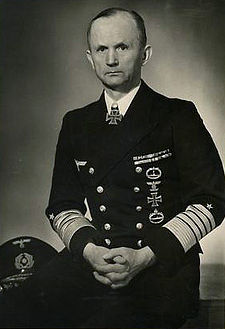


From Mein Kampf:
Hitler's Report Card from Steyr Realschule:49
1st Semester 2nd Semester
Moral Conduct 3 satisfactory 3 satisfactory
Diligence 4 unequal 4 adequate
Religion 4 adequate 3 satisfactory
German 5 inadequate 4 adequate
Geography-History 4 adequate 3 satisfactory
Mathematics 5 inadequate 3 satisfactory
Chemistry 4 adequate 4 adequate
Physics 3 satisfactory 4 adequate
Geometry, geo drawing 4 adequate 4 adequate
Freehand Drawing 2 laudable 1 excellent
Gymnastics 1 excellent 1 excellent
Stenography 5 inadequate x
Singing x 3 satisfactory
Handwriting 5 displeasing 5 displeasing

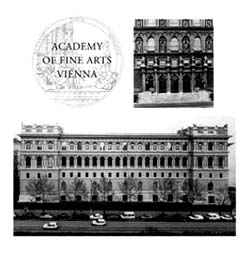
My mother, to be sure, felt obliged to continue my education in accordance with my father's wish; in other words, to have me study for the civil servant's career. I, for my part, was more than ever determined absolutely not to undertake this career. In proportion as my schooling departed from my ideal in subject matter and curriculum, I became more indifferent at heart.
Then suddenly an illness came to my help and in a few weeks decided my future and the eternal domestic quarrel. As a result of my serious lung ailment, a physician advised my mother in most urgent terms never to send me into an office. My attendance at the Realschule had furthermore to be interrupted for at least a year. The goal for which I had so long silently yearned, for which I had always fought, had through this event suddenly become reality almost of its own accord. Concerned over my illness, my mother finally consented to take me out of the Realschule and let me attend the Academy (Note: The Academy of Fine Arts in Vienna).
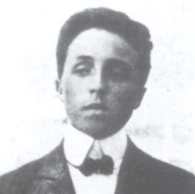
1908 August Kubizek: Hitler's roommate and closest friend, August Kubizek, is called up for military service, leaving Hitler alone in the Stumergasse. [For further details, Click here.]
1909: After less than a month at 58 Sechshauserstrasse, Hitler moves out, under unknown circumstances. Contravening the law, he fails to file the proper change-of-residence forms with the local police. His savings are now probably long gone and, while he is still receiving his small orphan’s pension, it can be assumed that it is not enough to maintain both lodgings and food. He now undergoes a period of homelessness, presumably spending his nights on park benches or other accessible areas.8
Click to Enlarge
Hitler: St. Peter’s Church, Vienna
While there are many charitable organizations active in Vienna, they are not enough to meet the needs of all of the city’s homeless. There are long lines at the Waermestuben (warming-up rooms), shelters, and soup kitchens; and many are regularly turned away. Hitler now turns to these resources as he struggles to stay warm, and feed himself, amidst the downtrodden masses. Near his first apartment in Vienna is the Hospital of the Sisters of Mercy, where free soup is distributed. One of the relatives of his former landlady, Frau Zakreys, testified to seeing him there, "standing in the cloister’s soup line; his clothes looked very shabby, and I felt sorry for him, because he used to be so well dressed."9
Viennese social-affairs reporter and author, Ernst Klaeger, described one of the Waermestuben in the Brigittenau district:
We now stumbled through a dark gate, entering a large, and only dimly lit room, where long benches, on which people were squeezed together, were put up in all directions. The sight of these people, sitting in long crammed lines, so that there was no room to move even slightly, caused us physical pain, and we hardly felt it when the warden used his elbows to make enough room for us to force ourselves into the long line of pent-up people . . . . We sat in this painful position for hours . . . . Yet, around us, there was dead silence. As if under a spell, people remained motionless within the quadrangle of the benches, looking like a ghastly gallery of the dead, whom someone had had put one next to the other, as if for some horrible amusement . . . . Welfare institutions are society’s failed attempts to rid itself of its guilty conscience. They appeared to me like a bad dream image, those vast crowds of believers who wait out there in the barren darkness, outside the bright gates of our rich life, utterly blinded by its external beauty. One must have seen them the way I saw them: suppliant, with greedy eyes; threatening, and foaming with rage in their powerlessness, thousands and thousands of society’s enemies, raised by our mercy.10
[For further details, Click here.]1910: Birth: Erich Kempka: Adolf Hitler's chauffeur:
He will become an Oberstürmbannführer in the Allgemeine SS, serving as Hitler's chauffeur from 1934. In 1945, he reports to the Führerbunker and is among those responsible for burning the bodies of Hitler and his bride. At Nuremburg, he will testify concerning the death of Martin Bormann. [For further details, Click here]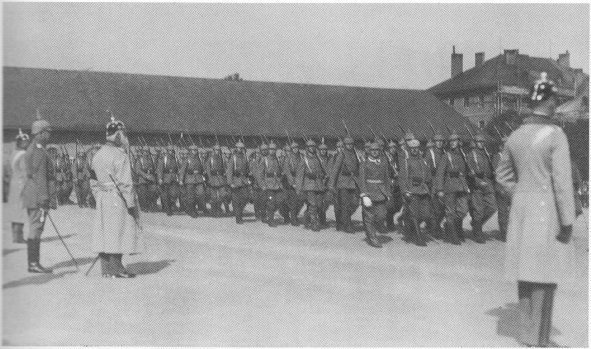
1915 World War I: Various:
From Talaat Pasha's Official Orders Regarding the Armenian Massacres:
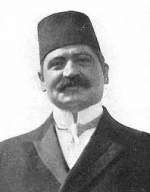
You have already been advised that the Government, by order of the Djemiet, has decided to destroy completely all the indicated persons [Armenians] living in Turkey. All who oppose this decision and command cannot remain on the official staff of the empire. Their existence must come to an end, however tragic the means may be; and no regard must be paid to either age or sex, or to conscientious scruples.

1916 World War I: Various: Hindenburg gives order to strengthen German defenses:
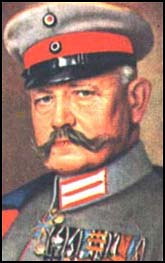
On September 16, 1916, one month after succeeding Erich von Falkenhayn as chief of the German army’s general staff during World War I, General Paul von Hindenburg orders the construction of a heavily fortified zone running several miles behind the active front between the north coast of France and Verdun, near the border between France and Belgium.
This "semi-permanent" defense line, as Hindenburg called it, would be the last line of German defense; its aim was to brutally crush any Allied breakthrough on the Western Front in France before it could reach the Belgian or German frontier. The British referred to it as the Hindenburg Line, for its mastermind; it was known to the Germans as the Siegfried Line. [For further details, Click here]
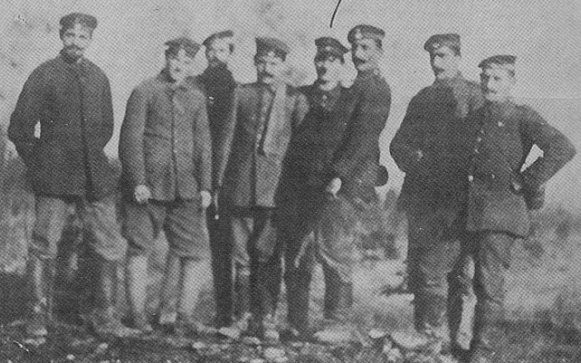
Hitler and his fellow dispatch runners
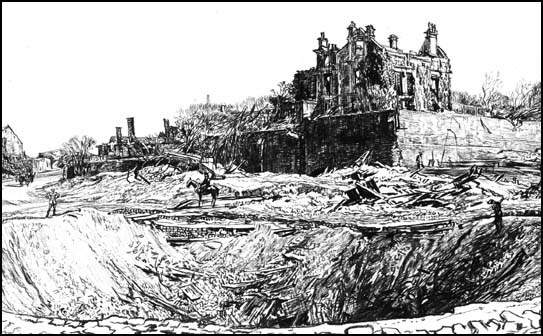
1918 World War I
: Various:Saint-Mihiel: US General Pershing's assault on the, salient the first US Army operation of the war, is completely successful, and the salient is entirely cleared.
If a man threatening to shoot you suddenly throws away his pistol, would you be frightened? If a prize fighter broke training a month before his big fight, would his opponent be discouraged? In 1916, when President Wilson was sending us ultimatums threatening war, he was at the same time disbanding the small army that he had taken all the summer of 1916 to get together on the Mexican border. Does it seem now we were so foolish because we figured it would take years for you really to face us with an effective fighting army—-and that in those intervening years we had a good chance to win? What does the record of the war show above everything else? Something very simple: that just as in a prize fight a war is won only by fighting.
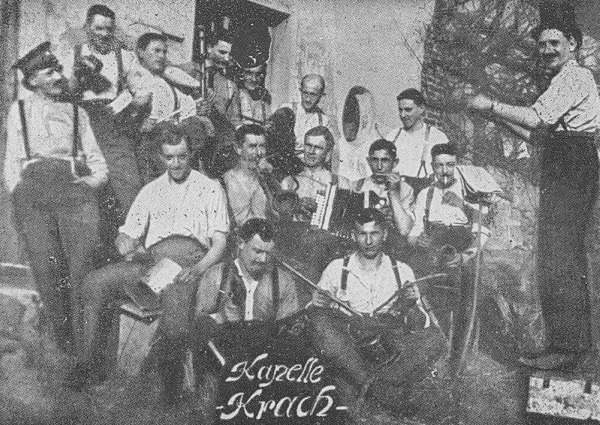
1919 Various:
The American Legion
is incorporated by an act of US Congress.Hitler's first known political writing:
Hitler returned from a military hospital to Munich in early 1919. There he underwent a Reichswehr sponsored course of systematic political education for demobilizing soldiers that featured Pan-German nationalism, antisemitism, and anti-socialism. These same themes were prominent in Bavarian politics following the repression of the Munich revolution of 1918-19. Because antisemitism had not played a notable part in Bavarian politics prior to the revolutionary disturbances, a Herr Adolf Gemlich was prompted to send an inquiry about the importance of the "Jewish question" to Captain Karl Mayr, the officer in charge of the Reichswehr News and Enlightenment Department in Munich. Mayr referred him to Hitler, who had distinguished himself in the above-mentioned course by the vehemence of his radical nationalist and antisemitic views, and by his oratorical talents. Hitler was already feeling his way toward a political career; four days before responding to Gemlich in the letter translated below, he had paid his first visit to the German Workers' Party (eventually renamed, the National Socialist Workers' Party) as a confidential agent of the Reichswehr. [For further information and translation of the letter, Click here.
[See: When Did Hitler Become an Anti-Semite?]1920 The Wall Street bombing: Thirty people are killed in a terrorist bombing in New York's Wall Street financial district; a bomb in a horse wagon.
1930 Hitler gives an election speech in Munich:
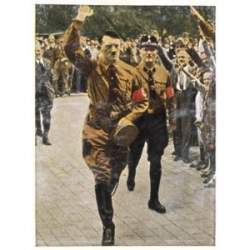
Do not write on your banners the word 'Victory.' Today that word shall be uttered for the last time. Strike through the word 'Victory' and write once more in its place the word which suits us better: The word FIGHT!!!.
1935 Church and Reich: The central office of the German episcopate in Berlin reports that previously Catholic couples of racially mixed descent had traveled to England to get married, but now even those marriages have become illegal. (THP)
1936 Press Reaction to Hitler's September 14 Speech: 1938 Sudeten Crisis: 1939 World War II: The German Ambassador in the Soviet Union (Schulenburg) to the German Foreign Office: I saw Molotov at 6 o'clock today and carried out instructions. Molotov declared that military intervention by the Soviet Union was imminent-perhaps even tomorrow or the day after. Stalin was at present in consultation with the military leaders and he would this very night, in the presence of Molotov, give me the day and hour of the Soviet advance. Molotov added that he would present my communication to his Government but he believed that a joint communiqué was no longer needed; the Soviet Government intended to motivate its procedure as follows: the Polish State had collapsed and no longer existed; therefore all agreements concluded with Poland were void; third powers might try to profit by the chaos which had arisen; the Soviet Union considered itself obligated to intervene to protect its Ukrainian and White Russian brothers and make it possible for these unfortunate people to work in peace. The Soviet Government intended to publicize the above train of thought by the radio, press, etc., immediately after the Red Army had crossed the border, and at the same time communicate it in an official note to the Polish Ambassador here and to all the missions here. Molotov conceded that the projected argument of the Soviet Government contained a note that was jarring to German sensibilities but asked that in view of the difficult situation of the Soviet Government we not let a trifle like this stand in our way. The Soviet Government unfortunately saw no possibility of any other motivation, since the Soviet Union had thus far not concerned itself about the plight of its minorities in Poland and had to justify abroad, in some way or other, its present intervention. In conclusion, Molotov urgently asked for an explanation of what was to become of Vilna. The Soviet Government absolutely wanted to avoid a clash with Lithuania and would, therefore, like to know whether some agreement had been reached with Lithuania regarding the Vilna region, particularly as to who was to occupy the city.
1940 Various: Franklin Roosevelt approves military draft:
On this day in 1940, President Franklin D. Roosevelt signs the Selective Service and Training Act, which requires all male citizens between the ages of 26 and 35 to register for the military draft, beginning on October 16. The act had been passed by Congress 10 days earlier.
America was not yet involved in the Second World War, but Roosevelt considered it a prudent step to train American men for military service in case the U.S. would have to defend itself against the growing threat of fascist and militarist regimes in Europe and Japan. At the time, Poland, Holland, Belgium, France and Norway had been invaded by Germany and word had begun to spread of Hitler's persecution of Jews and other minorities in concentration camps. It appeared that Great Britain would be next on the list of Nazi casualties. From July 1940, Hitler's Air Force bombarded England and the German navy blockaded the island nation in preparation for a planned invasion.
Roosevelt responded to British distress by selling the country more military equipment and providing increased humanitarian aid. After signing the Selective Service Act, Roosevelt warned, "America stands at the crossroads of its destiny. Time and distance have been shortened. A few weeks have seen great nations fall. We cannot remain indifferent to the philosophy of force now rampant in the world. We must and will marshal our great potential strength to fend off war from our shores. We must and will prevent our land from becoming a victim of aggression."
Although many Americans preferred to stay out of another conflict in Europe—World War I was still fresh in many minds—there was little resistance to the draft and, in the end, the measure might have been unnecessary. After the Japanese bombed Hawaii's Pearl Harbor on December 7, 1941, American men flocked to recruitment centers to enlist in the military. (History.com) North Africa: Italy captures the town of Sidi Barrani, but its invasion of Egypt progresses no further. [For further information, click here.]
1941 World War II: Various:
Reza Shah Pahlavi, the pro-German ruler of Iran, is forced to abdicate in favor of his son by the British: Reza Shah was soon forced into exile by the British forces to British territories, first to Mauritius, then to Durban thence Johannesburg, South Africa, where he died on July 26, 1944, of heart ailment from which he had been complaining for many years. (His personal doctor had boosted the King's morale in exile by telling him that he was suffering from chronic indigestion and not heart ailment. He lived on a diet of plain rice and boiled chicken in the last years of his life) He was sixty-six years old at the time of his death. [For further details, Click here]
USA: Secretary of the Interior Harold Ickes has lunch with Bernard Baruch and asks him why Edward Stettinius, who he says has been a failure at every job he has held so far, has been moved up by the President to the important position of Administrator of the Lend Lease Act. Baruch tells him that he believes it is a ploy to protect Harry Hopkins. Baruch says he believes that Hopkins is now, in effect, Assistant President, but that his standing on the (Capitol) Hill is such that he needs someone to front for him. "So Stettinius has been given that title, but he can be depended upon to do whatever Harry (Hopkins) tells him to do. (THP)
From an order issued by Wilhelm Keitel at Hitler's direction: Subject: Communist insurrection in occupied territories: 1. Since the beginning of the campaign against Soviet Russia, Communist insurrection movements have broken out everywhere in the area occupied by Germany. The type of action taken is growing from propaganda measures and attacks on individual members of the Armed Forces into open rebellion and widespread guerilla warfare. It can be seen that this is a mass movement centrally directed by Moscow, which is also responsible for the apparently trivial isolated incidents in areas which up to now have been otherwise quiet. In view of the many political and economic crises in the occupied areas, it must, moreover, be anticipated that nationalist and other circles will make full use of this opportunity of making difficulties for the German occupying forces by associating themselves with the Communist insurrection. This creates an increasing danger to the German war effort, which shows itself chiefly in general insecurity for the occupying troops, and has already led to the withdrawal of forces to the main centers of disturbance.
2. The measures taken up to now to deal with this general Communist insurrection movement have proved inadequate. The Fuehrer has now given orders that we take action everywhere with the most drastic means, in order to crush the movement in the shortest possible time. Only this course, which has always been followed successfully throughout the history of the extension of influence of great peoples, can restore order.
3. Action taken in this matter should be in accordance with the following general directions: a. It should be inferred in every case of resistance to the German occupying forces, no matter what the individual circumstances, that it is of Communist origin. b. In order to nip these machinations in the bud the most drastic measures should be taken immediately and on the first indication, so that the authority of the occupying forces may be maintained and further spreading prevented. In this connection it should be remembered that a human life in the countries concerned frequently counts for nothing, and a deterrent effect can be attained only by unusual severity. The death penalty for 50-100 Communists should generally be regarded in these cases as suitable atonement for one German soldier's death. The way in which sentence is carried out should still further increase the deterrent effect. The reverse course of action, that of imposing relatively lenient penalties and of being content, for purposes of deterrence, with the threat of more severe measures does not accord with these principles and shall not be followed...The commanding officers in the occupied territories shall see to it that these principles are made known without delay to all military establishments concerned in dealing with Communist measures of insurrection.
Note: there was some sympathy for Keitel and indeed, he was eventually rehabilitated in his own town, where a monument stands. But the above order condemning 50-100 Communist civilians to death in reprisal for the death of one German soldier meant that he was rightly condemned to death. There is no acceptable plea that he had no option. A German officer concerned with his honor would not sign such an order, wherever it came from above him.
Hermann Goering: at a meeting of German military officials concerned with the better exploitation of the occupied territories for the German food economy: In the occupied territories on principle only those people are to be supplied with an adequate amount of food who work for us. Even if one wanted to feed all the other inhabitants, one could not do it in the newly occupied Eastern areas. It is, therefore, wrong to funnel off food supplies for this purpose if it is done at the expense of the Army and necessitates increased supplies from home.
1942 World War II: Various:
The Japanese base at Kiska in the Aleutian Islands is raided by American bombers.
Stalingrad: German army enters outskirts of city: Fighting soon becomes street-to-street, block-to-block, house-to-house combat: On September 15th, the city railway station changed hands 4 times. But by the nighttime we seized it and drove the enemy out. I can't say for certain now who held the Mamayev Hill in the night from September 14th to 15th. But on the morning of September 16th, after heavy fighting, the 42nd regiment, under the command of Colonel Yerin, re-captured the Mamayev Hill. The fighting for elevators lasted several days. Even now I can hear division commander Dubyansky saying the following while making a report: "The situation has changed radically. Earlier we were on the elevator's top and the fascists downstairs. Now we've dislodged the enemy from the ground floor but some fascists have infiltrated upstairs, and now the fighting is going on in the upper stories.
Holocaust: Forty Bulgarian-born Jews are among those deported to Auschwitz from Paris. No Jews in Bulgaria had yet been deported to Auschwitz. (THP)
Völkishness: Heinrich Himmler in a speech at Hegewald says that the blood that coursed through the veins of Genghis Khan, Attila the Hun, and Stalin was German. (THP) [Editor's Note: had he not committed suicide shortly after giving himself up, even a mediocre lawyer might have made a good plea that his client was unfit to stand trial on the grounds of insanity.]
1943 World War II: Italy: General Clark's forces join up with the British 8th Army advancing northward from southern Italy. German counterattacks against the US bridgehead at Salerno are halted. Just before the 5th US Army landed at Salerno, below Naples on the 9th, the Italian government had surrendered and ordered Italians not to resist. Soon, both armies had captured the lower part of Italy.
1944 Various:
Death: Gustav Bauer:
World War II: Hitler shuffles his cards and begins planning for a counteroffensive in the West: The Eastern Front is far too vast, Hitler says, and the Russians much too superior in number for such an operation to succeed. Chances are much better in the West. Editor's Note: One of the key factors in the defeat of Germany in WWII was Hitler's vacillations. World War II: Conclusion of the Quebec meeting between Roosevelt and Churchill who sign off on the Morgenthau Plan 1946 Nuremberg Tribunal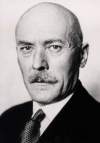

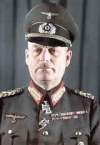


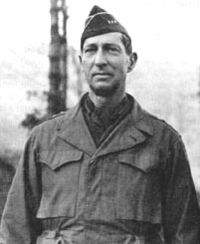
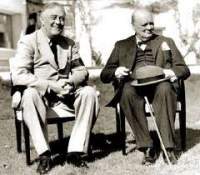
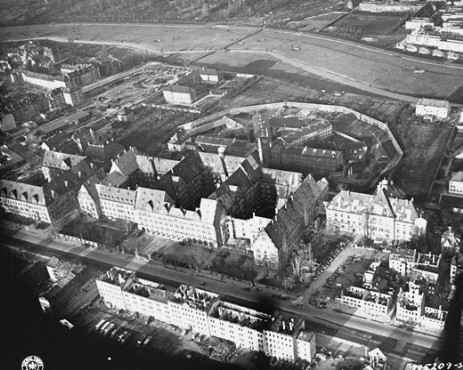
1950 Cold War: United Nations essay contest angers Soviets:
On this day, Soviet representatives condemn an essay writing contest sponsored by the United Nations. The incident, though small, indicated that the Cold War was as much a battle of words as a war of bombs and guns.
In 1950, the Public Information Department of the United Nations hit upon an idea to stir interest among young people in the work of the United Nations: an essay contest. The theme for the contest was "The Veto." The question posed to the contestants was: "Has the rule of unanimity (the veto) prevented the United Nations from functioning in the political and security field?" The question referred to the fact that resolutions in the U.N.'s Security Council (which handled the most important "political and security" issues) had to be approved by each of the so-called "Big Five" nations—the United States, the Soviet Union, Great Britain, France, and Nationalist China. One negative vote by any of these nations would veto any action on the resolution. It was a particularly timely topic. In June 1950, the Korean War began when communist North Korea invaded South Korea. The United States immediately asked the Security Council to approve the use of U.N. forces to repel the North Korean attack. The resolution passed only because the Soviet Union was absent that day, in protest of the exclusion of communist China from the United Nations.
The essay contest rankled the Soviet's U.N. representatives. The Soviets were famous for using their veto power in the Security Council; they cast 45 vetoes in the first five years of the U.N.'s existence. The chief Soviet delegate to the United Nations, Jacob Malik, launched into a tirade about the essay contest on September 16, 1950. He claimed that U.N. Secretary General Trygve Lie had promised to end the contest. He was infuriated to learn that it was still on, and that winners were about to be announced. Malik declared that the contest organizers "aimed at undermining one of the basic principles of the United Nations Charter." Exactly what that "basic principle" entailed was not stated. Lie merely replied that he was "surprised that the Soviet delegation should take such interest in a relatively minor administrative question."
Later that day, the 10 contest winners—including one from Czechoslovakia—were announced. For their efforts, they received free transportation to the United States (no U.S. citizens had been allowed to participate, to avoid any claims of favoritism), were awarded a 30-day stay at the U.N. headquarters in New York, and given $10 a day to cover expenses. Most of the essays concluded that the veto interfered with, but did not destroy, the United Nation's effectiveness. (History.com)
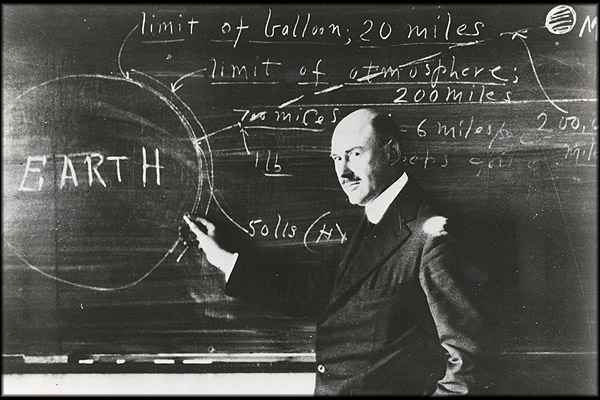
1959 The US Congress authorizes the issuance of a gold medal, in honor of Professor Robert H. Goddard.
[See: Wunderwaffen: Hitler's Deception and the History of Rocketry.]Edited by Levi Bookin (Copy editor) Click to join 3rdReichStudies
Disclaimer: This site includes diverse and controversial materials—such as excerpts from the writings of racists and anti-Semites—so that its readers can learn the nature and extent of hate and anti-Semitic discourse. It is our sincere belief that only the informed citizen can prevail over the ignorance of Racialist "thought." Far from approving these writings, this site condemns racism in all of its forms and manifestations.
levi.bookin@gmail.com










Fair Use Notice: This site may contain copyrighted material the use of which has not always been specifically authorized by the copyright owner. We are making such material available in our efforts to advance understanding of historical, political, human rights, economic, democracy, scientific, environmental, and social justice issues, etc. We believe this constitutes a "fair use" of any such copyrighted material as provided for in section 107 of the US Copyright Law. In accordance with Title 17 U.S.C. Section 107, the material on this site is distributed without profit to those who have expressed a prior interest in receiving the included information for research and educational purposes. If you wish to use copyrighted material from this site for purposes of your own that go beyond 'fair use', you must obtain permission from the copyright owner.
Please Note: The list-owner and moderators of 3rdReichStudies are not responsible for, and do not necessarily approve of, the random ads placed on our pages by our web server. They are, unfortunately, the price one pays for a 'free' website.



